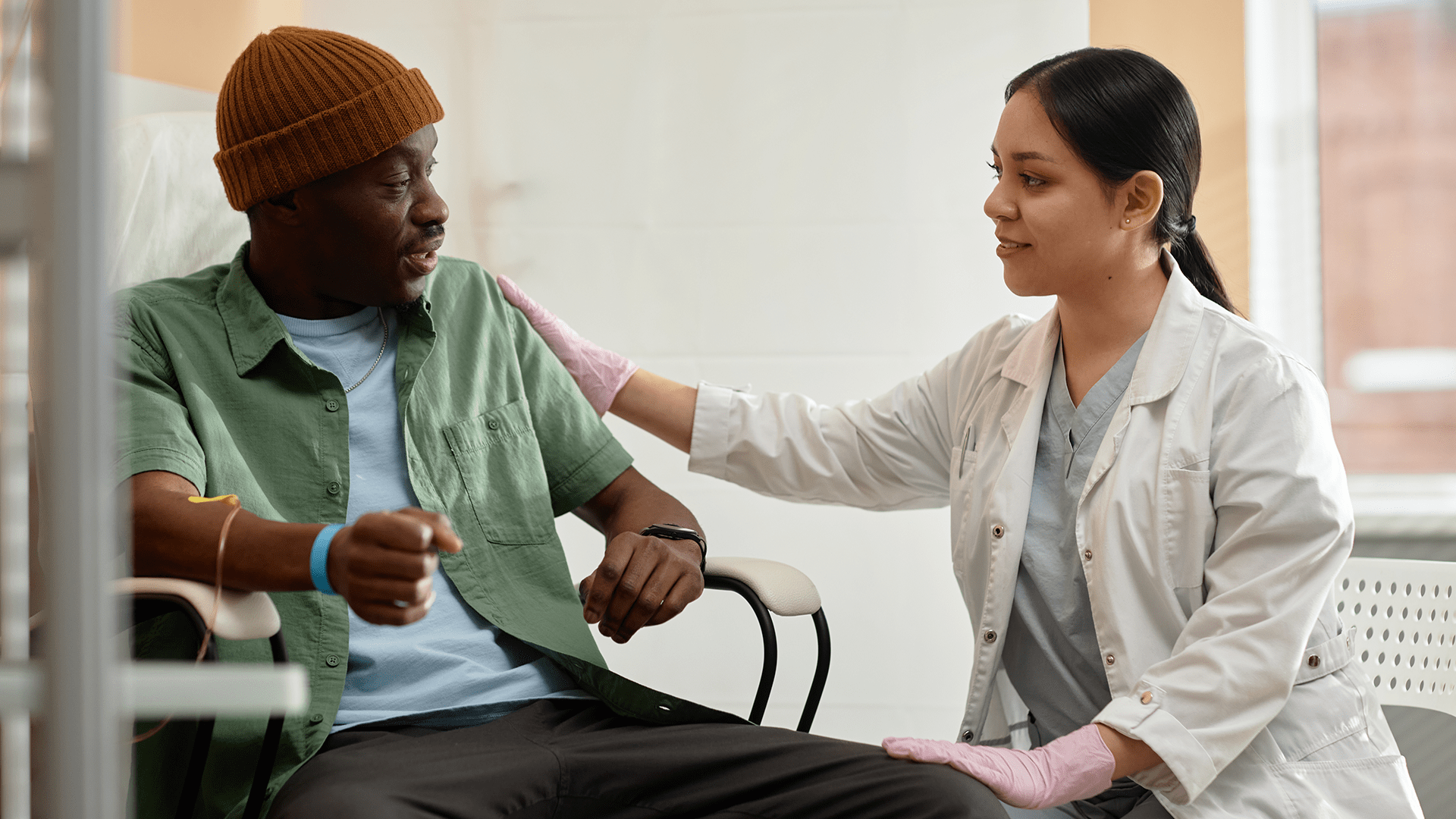Communicating With Your Health Care Team
Do you understand the information you’re getting from your health care team? Do you know what questions to ask? You need good communication to get the best care from your health care team members.

Your health care team is made up of professionals such as doctors, nurses, social workers, psychologists, pharmacists and others who care for your physical and mental health. Each member of your team is specially trained to help you cope with certain aspects of your life during and after cancer treatment.
Members of your health care team may seem very busy. However, it’s important that you have time together to discuss questions and concerns. When you schedule your appointment, you may need to ask for extra time to have these conversations.
Preparing for Your Medical Appointments
The most convenient time to communicate with your health care team is during scheduled appointments. Prepare in advance for health care visits. If you can provide specific information and ask clear questions, you’ll make the most of your time.
Survivors who speak a language that is a different language than the health care team or those who have a hearing loss may need to have an interpreter present. You health care team can help you find one if necessary. Some medical facilities have interpreters who work as staff members. It is not a good idea to have a young child or family member serve in this role because they may not understand important components of what is being said or may have their own reactions.
Those with memory or concentration problems can consider asking an adult family member or friend to come to medical appointments to help take notes.
Notes to take to your appointments:
- Any questions you have.
- How you have been feeling (physically and emotionally).
- Changes in your body.
- Your worries and concerns.
- Issues related to treatments and side effects.
- Insurance and benefit coverage that could affect health care choices.
- New cancer support programs and resources.
Consider bringing a friend or family member with you to appointments. That person can write down the information you receive and help you ask questions. You need to feel comfortable that the person will be supportive and helpful. If there is no one to who can go with you, ask your health care provider if you can record the meeting.
Ways to Prepare for Appointments
- Keep track of your medications. Bring a list of your medications (both prescribed and over-the-counter) to your appointments. The list should include dates taken, doses and any side effects or reactions noted. You may also want to bring all of your medication bottles.
- Take notes during appointments. Write down the date and time of your next appointment.
- Bring extra copies of important documents to give to the health care team for your file. You can also email or fax these documents in before the visit.
- Store pamphlets, medication and side effect inserts, and important papers and phone numbers in one place such as a file, notebook or box.
Getting in Touch With Your Health Care Team
There may be times in between appointments when you need to communicate with your health care providers. Ask your health care provider what to do if this happens. If your concerns aren’t urgent, but you don’t want to wait until the next scheduled appointment, ask to have a health care team member call you. You can also fax or email a list of questions to your health care team. They can then prepare a response and call or email you to discuss it further.
If you have a medical emergency, contact your hospital emergency room and your health care team right away. Do not try to wait until your next scheduled appointment.
Communication Styles
Each individual has a unique communication style. Find a way in which you are comfortable communicating with your health care team. This can help you feel more confident about the quality of health care you’re receiving.
Research shows that talking about your cancer is difficult at all education levels and backgrounds. However, some come from backgrounds that have a very deep respect for authority and medical providers. This may make it difficult for them to share concerns or talk about very personal issues. It might also seem to be disrespectful to ask questions of their health care team.
Sometimes personalities and communication styles might not a good fit. If this happens to you, try to talk with the health care provider about your concerns. There may be ways to improve communication. If communication doesn’t improve, you have the right to request a different medical provider.
Signs of communication breakdown with your health care team:
- When you leave the health care provider’s office, you still have questions or concerns.
- You feel there’s never enough time to discuss questions or concerns with your health care team.
- You feel that health care team members aren’t open to discussing your questions, concerns or problems.
Improving Communication
If one member of the health care team cannot answer a question, other members of your team may be able to help. If you can’t get the help you need, consider getting another opinion or changing medical professionals.
Sometimes a member of the health care team might suggest getting a second opinion. You could be directed to another provider that may be better able to meet your needs. If this happens, it doesn’t mean that your health care provider does not care about your situation. They want to make certain you get the best possible answer from a professional who specializes in that area.
Asking questions may be one of the best ways to learn about taking care of your health during and after cancer. Open communication with your health care team can also help you to be aware of new developments in care and treatments.
Good communication with your health care team will help you:
- Find out about current information related to your cancer and treatment.
- Participate in decisions about your medical care.
- Better manage your symptoms and get quality follow-up care.
- Make the most of the time you have with your health care team.
- Reduce stress by making sure your questions are answered.
- Feel confident that you are getting the best health care.
It is important for both survivors and members of their health care team to recognize that there may always be a need to ask questions and talk over new information. This can occur even years after your treatment for cancer ends. Good communication begins from the moment of diagnosis and should continue beyond completion of cancer treatment.

